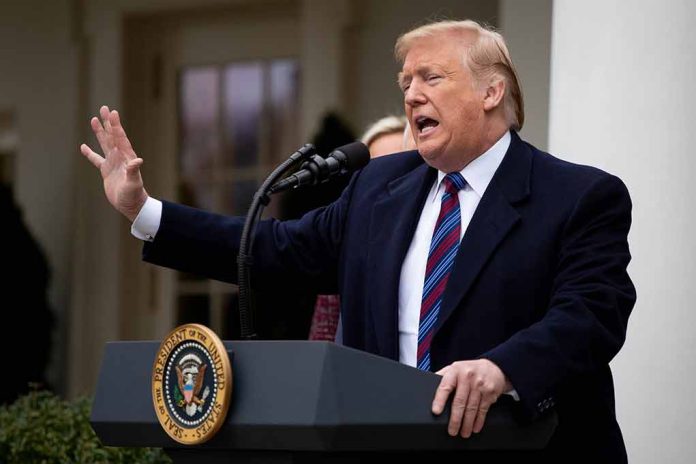
President Trump reinstates essential English language requirements for truck drivers, reversing Obama-era policy and drawing wide industry support.
Key Takeaways
- Trump signed an executive order reinforcing federal law requiring commercial truck drivers to demonstrate English language proficiency.
- The order rescinds a 2016 Obama administration policy that relaxed English proficiency enforcement.
- Industry organizations including the American Trucking Associations and Owner-Operator Independent Drivers Association strongly support the measure.
- Drivers must be able to read traffic signs, communicate with law enforcement, and complete accurate reports.
- Non-compliant drivers will be placed out-of-service, with Transportation Secretary Sean Duffy tasked with enforcement.
Trump Reinstates Critical Safety Requirements for Highway Safety
President Donald Trump has signed an executive order reinforcing the federal requirement that commercial truck drivers demonstrate proficiency in English, citing serious safety concerns. The directive specifically targets what the administration describes as years of non-enforcement that has compromised roadway safety across America. The order directs Transportation Secretary Sean Duffy to rescind previous guidance that weakened the English Language Proficiency (ELP) law and to implement stronger enforcement mechanisms for commercial drivers operating throughout the United States.
In his executive order, Trump emphasized the importance of enforcement for public safety. “My Administration will enforce the law to protect the safety of American truckers, drivers, passengers, and others, including by upholding the safety enforcement regulations that ensure that anyone behind the wheel of a commercial vehicle is properly qualified and proficient in our national language, English,” declared Trump.
"On behalf of America's Truck Drivers, we, the founders of American Truckers United, extend our heartfelt gratitude to President Donald Trump and Transportation Secretary Sean Duffy for the executive order mandating English proficiency for all truck drivers and addressing the… pic.twitter.com/grnkiJ1BLg
— American Truckers (@atutruckers) April 29, 2025
Industry Leaders Support English Proficiency Enforcement
Major trucking organizations have voiced strong support for Trump’s executive order. The Owner-Operator Independent Drivers Association (OOIDA), representing approximately 150,000 truck drivers, has been particularly vocal about restoring the English proficiency requirement. Todd Spencer, speaking for the organization, stated, “OOIDA and the 150,000 truckers we proudly represent strongly support President Trump’s decision to resume enforcement of English proficiency requirements for commercial drivers.”
The American Trucking Associations and the Arkansas Trucking Association have also endorsed the measure, with the latter organization’s president Shannon Newton noting, “After successfully advocating for solutions in Arkansas, we’re pleased to see this issue elevated to the national level where it can have the greatest impact.” Industry stakeholders have specifically highlighted the importance of consistent enforcement standards across all states to ensure uniform safety practices nationwide.
Practical Applications of the English Proficiency Requirement
Federal law mandates that commercial drivers meet specific English proficiency standards for essential safety reasons. Drivers must demonstrate the ability to read and understand highway signage and signals, effectively communicate with law enforcement and safety officials, and accurately complete reports and records. Transportation Secretary Sean Duffy has been explicit about the legal foundation for this requirement. “Federal law is clear: a driver who cannot sufficiently read or speak English – our native language – and understand road signs is unqualified to drive a commercial motor vehicle in America,” stated Duffy.
The executive order specifically reverses a 2016 memorandum issued during the Obama administration that effectively abolished enforcement of the language-proficiency requirement. Under the reinstated policy, commercial drivers failing to meet the English proficiency standard will be “placed out-of-service,” preventing them from operating commercial vehicles on American roadways. The order tasks the Department of Transportation with revising the out-of-service criteria to create more effective enforcement mechanisms for language proficiency violations.
Part of Broader Language Policy Initiatives
This executive order aligns with Trump’s broader efforts to reinforce English as the official language of the United States. Industry representatives view the measure not as a punitive action but as a necessary safety protocol that protects all road users. The reinstated requirement aims to address significant safety concerns raised by multiple stakeholders about unqualified drivers operating commercial vehicles without the ability to understand critical road communications, potentially resulting in preventable accidents.
Beyond the English proficiency requirement, Trump also signed a separate order directing officials to publish lists of “sanctuary city” jurisdictions. Both orders reflect the administration’s focus on law enforcement and national standards. Safety advocates have pointed to the English proficiency requirement as a commonsense measure that helps ensure commercial drivers can operate safely within the existing transportation infrastructure and communicate effectively during emergencies or routine enforcement stops.
Sources:
Trump signs executive order requiring truck drivers to speak English
Trucking industry reacts to Trump’s ELP executive order for drivers
Trump’s New Plan for Truck Drivers Will Enhance Safety, Drive Libs Out of Their Minds







